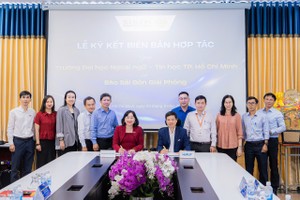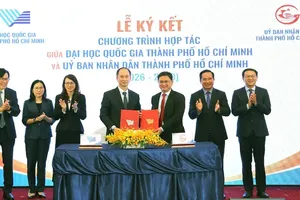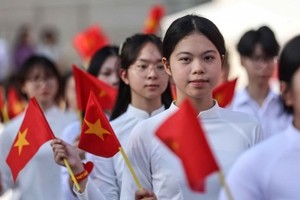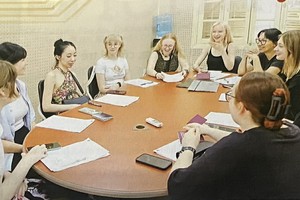The Ho Chi Minh City Vocational Education Association held a conference "Connecting international cooperation in the vocational education system" with the attendance of leaders of the General Department of Vocational Education, Ministry of Labor, War Invalids and Social Affairs and nearly 200 delegates from universities, colleges and intermediate schools in the city on April 16.
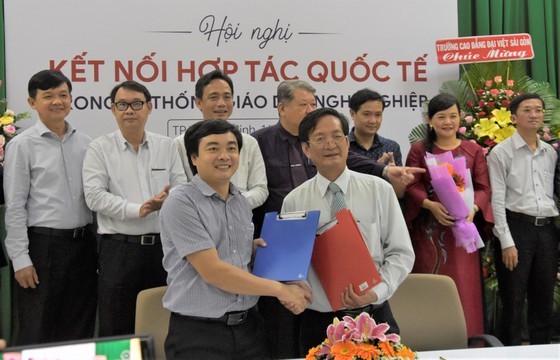 At the conference (Photo: SGGP)
At the conference (Photo: SGGP)
According to a statistics of the Ministry of Planning and Investment’s General Statistics Office, the Vietnamese labor force (aged 15 and over) is 55.46 million people accounting for more than half of the population with a rate of 57, 65 percent by the end of 2019. Of them, the trained workforce with diplomas and certificates accounts for 22.37 percent. Specifically, 10.82 percent of them are workers holding university or higher degree while 3.82 percent of them are college students, 4.65 percent of them have intermediate degrees and over 3.08 percent are at elementary level. This means that 77.63 percent of Vietnamese labor force has not been trained.
In comparison with other Asian countries, Vietnam has a very low rate of trained workers resulting in low labor productivity, affecting national competitiveness. Vietnam’s labor productivity is only 7.6 percent of Singapore’s productivity level, 19.5 percent of Malaysia, 37.9 percent of Thailand, 45.6 percent of Indonesia, 56.9 percent of the Philippines, 68.9 percent of Brunei.
In the coming time, if Vietnam does not have any effective solutions or measures to reduce this untrained labor quickly to raise labor efficiency and enterprises’ competitiveness in the international market, investors and service providers will turn their back on the country. Worse, employees are not confident in applying for a job; thus, they will lose their advantages when participating in the labor market. Their employability and employment promotion will decline.
Accordingly, labor experts and representatives from vocational training schools shared that an international cooperation will offer better opportunities for students and laborers to access to advanced countries in the world and the region. International cooperation also brings an opportunity for vocational education schools and centers to expand their curriculum and content in teaching as well as improve management capacity, the quality of training to meet the demand of human resources for enterprises contributing to rising the country’s economic competitiveness which means rising prosperity.
Do Huu Khoa, Rector of the Saigon Information Technology College, said that connecting international cooperation is one of the difficult fields, especially for each vocational training institutions and schools. Furthermore, it is necessary to define the needs of each school and each student in addition to selections of partners, key potential markets, high quality training before formal signing and implementing the cooperation in a bid to bring best results for learners.
Similarly, Deputy Dean of Korean Training University of Ho Chi Minh City University of Social Sciences and Humanities Tran Yen Loan said that international integration and cooperation have generated drastic changes in human structure, business and production activities in the future labor market. Therefore, international cooperation should be directed to worldly- recognized countries with leading technology and an outstanding education system, high academic performance.
Dao Trong Do, Director of the Continuing Training Department under the General Department of Vocational Education, said that international cooperation will bring many advantages as well as opening up greater opportunities for learners to who pursue studying in international schools in Vietnam at reasonable tuition fee.
Besides, from the actual implementation, the Ho Chi Minh City Vocational Education Association should have suggestions, suggestions and feedback on difficulties in vocational education; thereby, the association will perfect the legal corridors and mechanisms to attract learners to schools.
The Director of the Continuing Training Department under the General Department of Vocational Education also recommended that in the process of international cooperation, vocational schools need to pay attention to the legal corridor.
Additionally, school needs to define their strategies and policies for vocational education activities to ensure flexible connection with counterparts in the world. International cooperation must promote the development of vocational training of schools in particular and Vietnam in general; simultaneously, it must open up new opportunities for learners who will choose to learn their own new skills for the future use.
